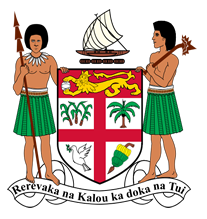Fiji: Government
Key Figures
- Chief of State:
- President Ratu Wiliame Katonivere
- Head of Government:
- Prime Minister Sitiveni Ligamamada Rabuka
Overview
- Government Name:
- Republic of Fiji
- Constitution:
- Adopted: 2013; Eliminates race-based electoral rolls, race-based seat quotas, direct-based representation, the unelected upper chamber, and the role of the hereditary Council of Chiefs. It also dictates that the Parliament of Fiji possess sole legislative power. First to ever grant the right to multiple citizenships and also lowers the voting age to 18.
- Government Type:
- Republic

Index of Economic Freedom
Country Risk Rating
Government Branches
| Main Powers | Election Process | Election Cycle 1 | |
|---|---|---|---|
| Executive | The highest executive powers are vested in the prime minister, whose duties include approving the house of people's representatives nominees for ministerial posts, being the chairman of the council of the ministers, and being the commander-in-chief of the national armed forces. |
The president is indirectly elected by parliament. The prime minister is elected by parliament. |
3 years |
| Judicial | Supreme federal judicial authority is vested in the federal supreme court. Judges shall exercise their functions in full independence and shall be directed solely by the law. The federal supreme court shall draw up and submit to the house of peoples' representatives for approval the budget of the federal courts. and upon approval, administer the budget. |
The chief justice is appointed by the president of Fiji on the advice of the prime minister following consultation with the parliamentary leader of the opposition. Judges of the supreme court, the president of the court of appeal, the justices of the court of appeal, and puisne judges of the high court are appointed by the president of Fiji, upon the nomination of the judicial service commission, after consulting with the cabinet minister and the committee of the house of representatives responsible for the administration of justice. |
Chief Justice, Supreme Court Judges, Justices of Appeal: mandatory retirement age of 70; Puisne Judges: in between 4 and 7-year terms with mandatory retirement age of 65 |
| Legislative | The legislature takes measures which promote unity with the consent of people and manages the implementation of the rights of nations and nationalities that fall under the jurisdiction of the house of the federation, as well as present recommendations in determining the division of revenues derived from joint federal and state tax sources which is proposed by the executive branch and the subsidies that the federal government may provide to the states. |
The Parliament has 55 seats in an open-list vote. |
4 years |
Regional Trade Blocs
No Regional Trade BlocsInternational Organization Participation [2]
Environmental Agreements [3]
Tax Information [2]
- Tax Authority:
- Information not available
- Tax Name:
- Information not available
Sources:
- ElectionGuide http://www.electionguide.org/
- EY, http://www.ey.com
- CIA World Factbook, https://www.cia.gov/the-world-factbook/
- U.S. Bilateral Relations Fact Sheets http://www.state.gov/r/pa/ei/bgn/


